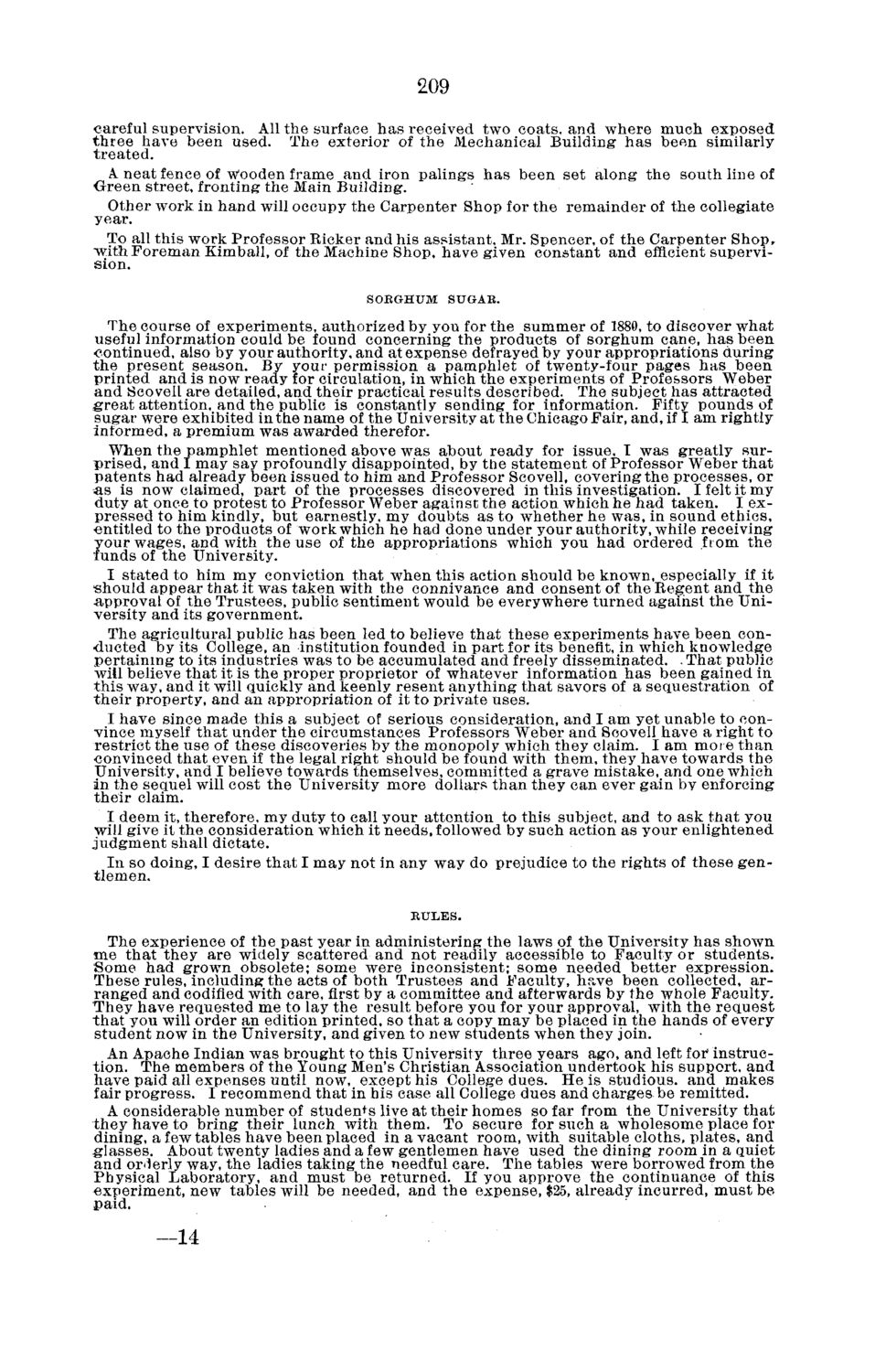| |
| |
Caption: Board of Trustees Minutes - 1882
This is a reduced-resolution page image for fast online browsing.

EXTRACTED TEXT FROM PAGE:
209 careful supervision. All the surface has received two coats, and where much exposed three have been used. The exterior of the Mechanical Building has been similarly treated. A neat fence of Wooden frame and iron palings has been set along the south line of Green street, fronting the Main Building. Other work in hand will occupy the Carpenter Shop for the remainder of the collegiate year. To all this work Professor Bicker and his assistant, Mr. Spencer, of the Carpenter Shop, with Foreman Kimball, of the Machine Shop, have given constant and efficient supervision. SORGHUM SUGAR. The course of experiments, authorized by you for the summer of 1880, to discover what useful information could be found concerning the products of sorghum cane, has been •continued, also by your authority, and at expense defrayed by your appropriations during the present season. By your permission a pamphlet of twenty-four pages has been printed and is now ready for circulation, in which the experiments of Professors Weber and Scovell are detailed, and their practical results described. The subject has attracted great attention, and the public is constantly sending for information. Fifty pounds of sugar were exhibited in the name of the University at the Chicago Fair, and, if I am rightly informed, a premium was awarded therefor. When the pamphlet mentioned above was about ready for issue, T was greatly surprised, and I may say profoundly disappointed, by the statement of Professor Weber that patents had already been issued to him and Professor Scovell, covering the processes, or as is now claimed, part of the processes discovered in this investigation. I felt it my duty at once to protest to Professor Weber against the action which he had taken. I expressed to him kindly, but earnestly, my doubts as to whether he was, in sound ethics, •entitled to the products of work which he had done under your authority, while receiving your wages, and with the use of the appropriations which you had ordered from the funds of the University. I stated to him my conviction that when this action should be known, especially if it should appear that it was taken with the connivance and consent of the Regent and the approval of the Trustees, public sentiment would be everywhere turned against the University and its government. The agricultural public has been led to believe that these experiments have been conducted by its College, an institution founded in part for its benefit, in which knowledge pertaining to its industries was to be accumulated and freely disseminated. . That public will believe that it is the proper proprietor of whatever information has been gained in this way, and it will quickly and keenly resent anything that savors of a sequestration of their property, and an appropriation of it to private uses. I have since made this a subject of serious consideration, and I am yet unable to convince myself that under the circumstances Professors Weber and Scovell have a right to restrict the use of these discoveries by the monopoly which they claim. I am more than •convinced that even if the legal right should be found with them, they have towards the University, and I believe towards themselves, committed a grave mistake, and one which in the sequel will cost the University more dollars than they can ever gain by enforcing their claim. I deem it, therefore, my duty to call your attention to this subject, and to ask that you will give it the consideration which it needs, followed by such action as your enlightened judgment shall dictate. In so doing, I desire that I may not in any way do prejudice to the rights of these gentlemen. RULES. The experience of the past year in administering the laws of the University has shown me that they are widely scattered and not readily accessible to Faculty or students. Some had grown obsolete; some were inconsistent; some needed better expression. These rules, including the acts of both Trustees and Faculty, have been collected, arranged and codified with care, first by a committee and afterwards by the whole Faculty. They have requested me to lay the result before you for your approval, with the request that you will order an edition printed, so that a copy may be placed in the hands of every student now in the University, and given to new students when they join. An Apache Indian was brought to this University three years ago, and left fof instruction. The members of the Young Men's Christian Association undertook his support, and have paid all expenses until now, except his College dues. He is studious, and makes fair progress. I recommend that in his case all College dues and charges be remitted. A considerable number of students live at their homes so far from the University that they have to bring their lunch with them. To secure for such a wholesome place for dining, a few tables have been placed in a vacant room, with suitable cloths, plates, and glasses. About twenty ladies and a few gentlemen have used the dining room in a quiet and orderly way, the ladies taking the needful care. The tables were borrowed from the Physical Laboratory, and must be returned. If you approve the continuance of this experiment, new tables will be needed, and the expense, $25, already incurred, must be paid. —14
| |